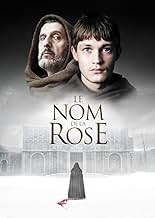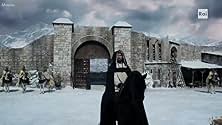एक बेनेडिक्टिन मठ में एक भिक्षु मृत पाया जाता है. फ्रांसिस्कन भिक्षु विलियम और उनके प्रशिक्षु एडसो जांच करते हैं और रहस्यमयी मौतों की एक श्रृंखला का पता लगाते हैं. हत्यारे की तलाश में वे एक ... सभी पढ़ेंएक बेनेडिक्टिन मठ में एक भिक्षु मृत पाया जाता है. फ्रांसिस्कन भिक्षु विलियम और उनके प्रशिक्षु एडसो जांच करते हैं और रहस्यमयी मौतों की एक श्रृंखला का पता लगाते हैं. हत्यारे की तलाश में वे एक घातक रहस्य का खुलासा करते हैं.एक बेनेडिक्टिन मठ में एक भिक्षु मृत पाया जाता है. फ्रांसिस्कन भिक्षु विलियम और उनके प्रशिक्षु एडसो जांच करते हैं और रहस्यमयी मौतों की एक श्रृंखला का पता लगाते हैं. हत्यारे की तलाश में वे एक घातक रहस्य का खुलासा करते हैं.
- पुरस्कार
- कुल 6 जीत
एपिसोड ब्राउज़ करें
फ़ीचर्ड समीक्षाएं
Totally agree with every word of trademarcdesigns review so I save the effort. They ruined Turturro's project. By the way he is the best of the series by large
In short: there is a reason why the central character in Eco's work is named after Occam and nods to Sherlock Holmes. It has to do with presenting complexity and then dealing with it though Occam's maxim and Holmes' deductive reasoning. Yet, the writers of this mess of an adaption seem to have not understood Eco or Rose at all and simply opted for injecting and proliferating haphazard disorder to mimic it complexity when it is just -- mediocre plot device and script-writing and. Sorry but gibberish is not complexity because it meanders, and proliferation non sequiter subplots are not semiotics just because your brain has to also work when decoding nonsense . It goes without saying as well that labyrinth is meaningless if you just proliferate blind ally diversions and don't understand it is the great classics Eco is presenting as the guide, the key.
If you've got that liberal arts degree for undergrad and loved history and literature, like I did, (before having to turn to something that can make some money for grad) they you probably knew about this series planning and had enthusiastic and positive expectations. The original film version of Name of the Rose was not bad, it was a decent adaption of Umberto's Eco's intricate but certainly his most approachable book, but it certainly could be much better fleshed out in a mini series length.
In addition to being a fan of Eco, I certainly am as well of John Turturro.
Sadly this series just doesn't work given the source material and talent. It is a serious disappointment; in fact a jumbled mess. Instead of using miniseries length to flesh out the complexity, tease the symbolism, and give us more of Eco, the writers went off the rails as well, distracting packing in all kinds of PC nods to contemporary issues that are not in Eco's novel. And even for "a loose adaptation" there is a continual sense of disjointed and artificially forced elements and messages that are not in Eco's work. Most galling -- but also telling -- metaphor for the utter humorlessness in the makers of this adaption is dropping emphasis on Aristotle's Poetics; whose dramatic theory, and utilization of humor, is what Eco is using. In the book we are immersed IN the Poetics, the author has structured he work so we are, while the character searches for it, along with a solution to the crime mystery, and this is not even attempted in this miniseries.
I spent about two years working in Italy and I have a high tolerance for the messiness of Italian productions, be they film, TV or contracting of goods or services. Things there are beautiful and interesting, but often don't work well. OK. I did not go into this adaption of name of the Rose expecting complete rationality or order. But there are so many artificial jumps in plot that it nears incoherence. Especially since none of it is really true to the core of Eco's work which has to do with the sequestration of knowledge, such as sublime and complex classics, and not for example some hamhanded lesson on immigration, class struggle, or violence toward women. Eco already had a strong and important social message with poverty and a church that lost its way, or whose future was being fought over. By throwing in the kitchen sink of social commentary this gets diluted to nothing.
I give this a six star, even though it is a four, since part of Eco is there, even if, with united irony -- it is hidden by the script writers' own nonsense.
If you've got that liberal arts degree for undergrad and loved history and literature, like I did, (before having to turn to something that can make some money for grad) they you probably knew about this series planning and had enthusiastic and positive expectations. The original film version of Name of the Rose was not bad, it was a decent adaption of Umberto's Eco's intricate but certainly his most approachable book, but it certainly could be much better fleshed out in a mini series length.
In addition to being a fan of Eco, I certainly am as well of John Turturro.
Sadly this series just doesn't work given the source material and talent. It is a serious disappointment; in fact a jumbled mess. Instead of using miniseries length to flesh out the complexity, tease the symbolism, and give us more of Eco, the writers went off the rails as well, distracting packing in all kinds of PC nods to contemporary issues that are not in Eco's novel. And even for "a loose adaptation" there is a continual sense of disjointed and artificially forced elements and messages that are not in Eco's work. Most galling -- but also telling -- metaphor for the utter humorlessness in the makers of this adaption is dropping emphasis on Aristotle's Poetics; whose dramatic theory, and utilization of humor, is what Eco is using. In the book we are immersed IN the Poetics, the author has structured he work so we are, while the character searches for it, along with a solution to the crime mystery, and this is not even attempted in this miniseries.
I spent about two years working in Italy and I have a high tolerance for the messiness of Italian productions, be they film, TV or contracting of goods or services. Things there are beautiful and interesting, but often don't work well. OK. I did not go into this adaption of name of the Rose expecting complete rationality or order. But there are so many artificial jumps in plot that it nears incoherence. Especially since none of it is really true to the core of Eco's work which has to do with the sequestration of knowledge, such as sublime and complex classics, and not for example some hamhanded lesson on immigration, class struggle, or violence toward women. Eco already had a strong and important social message with poverty and a church that lost its way, or whose future was being fought over. By throwing in the kitchen sink of social commentary this gets diluted to nothing.
I give this a six star, even though it is a four, since part of Eco is there, even if, with united irony -- it is hidden by the script writers' own nonsense.
I'm very sorry to say that this adaptation makes unnecessary changes to the book, and executes the climax very poorly. Adso's sin also goes unpunished, which dilutes a key theme of the book. They also mess up the murder mystery plot, which is the fun part of the book, that is the hook for all the philosophy. For modern audiences the original story has no strong female characters. They have tried to update the story, but inserting a Mary Sue like character does it no favours.
A lot of money has been spent on this production, and it shows. John Turturro is great, as always, and the supporting cast includes stalwarts such as Sebastian Koch, Rupert Everett, and Michael Emerson. But you might want to hold off on making the popcorn. The Name of the Rose is a big book, but Jean-Jacques Annaud showed us that it's possible to present it on film in just a couple of hours or so; nevertheless, this series has been expanded to 8 one-hour episodes. You might expect the producers would want to explore plot points from the book in greater detail, but that hasn't really happened. Instead the writers have been busy updating Eco's masterpiece to speak more directly to contemporary issues. In the first two episodes (all I've seen of the series), you can tick off feminism, immigration, torture, gay rights--you name it (perhaps your time would be better spent at the microwave after all). When it focuses on Eco's story, the series can be riveting, and I'm eager to learn more about the library. So what if Damian Hardung as Adso of Melk seems to belong to a different century?--that was also the impression I had of Christian Slater as Adso in Annaud's 1986 film, and it didn't ruin the story for me. John Turturro, on the other hand, is perfect as William of Baskerville, even if we won't be forgetting Sean Connery right away, and there's nary a hint of a Brooklyn accent in his delivery. So I guess I'm in for the long haul.
That's it. Watch the tv series and be yourself the critic. You should trust yourself to see it this adaptation is good or not.
That being said, I'd like to say that I've read the book on which these series is based, a monumental thriller set on the middle ages by the master Umberto Eco. I've seen the first two episodes, and I find myself thinking this is a nice start. Strangely to me, I come to see the reviews on this site and I'm baffled. Honestly, I really don't know what they saw. John Turturro is a great William of Baskerville and overall the setting is good. There is a bit of cgi on the landscapes, but mixed properly with real life places that look beautiful. Don't let these people misguide you, who knows what interests do they seek.
That being said, I'd like to say that I've read the book on which these series is based, a monumental thriller set on the middle ages by the master Umberto Eco. I've seen the first two episodes, and I find myself thinking this is a nice start. Strangely to me, I come to see the reviews on this site and I'm baffled. Honestly, I really don't know what they saw. John Turturro is a great William of Baskerville and overall the setting is good. There is a bit of cgi on the landscapes, but mixed properly with real life places that look beautiful. Don't let these people misguide you, who knows what interests do they seek.
क्या आपको पता है
- ट्रिवियाDialogues in medieval Occitan language have been translated and supervised by a team of experts from the University of Salerno.
टॉप पसंद
रेटिंग देने के लिए साइन-इन करें और वैयक्तिकृत सुझावों के लिए वॉचलिस्ट करें
- How many seasons does The Name of the Rose have?Alexa द्वारा संचालित
विवरण
इस पेज में योगदान दें
किसी बदलाव का सुझाव दें या अनुपलब्ध कॉन्टेंट जोड़ें
























